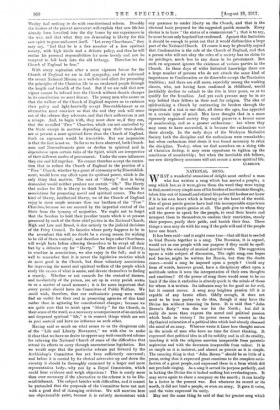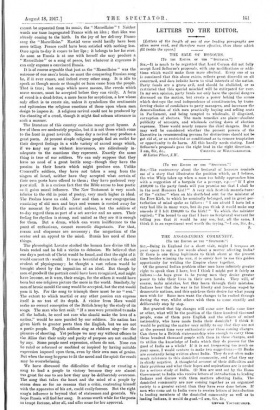NATIONAL SONG.
WHAT a wonderful sensation of delight must enthral a man who has written a song which has moved a people ; a song which has, as it were, given them the word-thoy were trying to find, eased every simple man of his burden of inarticulate-thought, taken him out of himself, and stirred his pulses till hedoes not know if it is his own heart which is beating or the heart of the -world. Men of great poetic genius have had this incomparable experience and men of no poetic genius at all. The gods give to villein they will the power to speak for the people, to read their hearts and interpret them to themselves,to confirm their conviction, steady their purpose, purify their pride, and banish their fear. These things a man may do with his song if the gods will and if the people have one heart.
It has-been said—and it might come true—that all that is needed to bind Russia together is a song. The Russians, it is argued, would act as one people with one purpose if they could be spell- bound by the wizardry of musical martial words. The -suggestion opens a wide subject of discussion._ The right song,-one hopes and fancies, might be written for Russia, but then the doubt comes—could a song be imposed upon a people ? Could any form of words, however grand, have a disciplinary effect upon a multitude unless it were the interpretation of their own thoughts and emotions? Of the power of song there would RCM to be no limit if the idea it embodies is already quick in the minds of those for whom it is written. Its influence may be for good or for evil, but it cannot coerce. A song may heighten passion fill it is capable of any heroic effort. Oddly enough, it does not need to be true poetry to do this, though it -may have the Divine fire without lessening its force. It is said that "John Brown's Body" won the war for the North.; but did it really do more than express the moral and political passion which leads to victory ? Its power seems to consist in- the rhythmical reiteration of a political idea-which had already obsessed the mind of an army. Whoever wrote it knew how thought moves in the -minds of men who have no time for direct thinking. It expressed that political idea in all its nobility and in all its crudity, touching it with the religious emotion inseparable from patriotic aspiration and with the fierceness inseparable from valour. It is as simple as it is insistent, and almost as prosaic as it is -simple. The amazing thing is that " John Brown " should be so little of a poem, seeing that it expressed great emotions to the complete satis- faction of a great people, and expressed them in a form which 'did not preclude singing. As a song it served its purpose perfectly, and in lacking the Divine fire it lacked nothing but everlastingness. It may serve again to cheer a company on the march ; it can hardly be a factor in the present war. But whatever its record or its worth, it did not bind a people, or even an army. It gave it voice, and the voice expressed its unity.
May not the same thing be said-of that far-greater-song -which
cannot be separated from its music, the Marseillaise " 4 Neither words nor tune impregnated France with an idea;. that idea was
already coming to the birth. In the joy of her delivery France sang the " Marseille.ise." Martial verse could hardly have been more telling. France could have been satisfied with nothing less.
Once again to-day it comes to her lips ; it belongs to her for ever. A8 soon as Russia is at one with herself she may produce a " Marseillaise " or a song of peace, but whatever it expresses it can only express a convinced Russia.
It is of course arguable that just as the "Marseillaise " was the outcome of one man's brain, so must the conquering Russian song
be, if it ever comes, and indeed every other song. It is idle to speak as though music or thought or form came from the people. That is true ; but songs which move masses, like creeds which move masses, must be accepted before they can vivify. A form of creed- s a dead-letter, a mere focus for acepticism, a law whose only effect is to create sin, unless, it symbolizes the sentiments and epitomizes the religious, emotions of. those upon whom men design to impose it. A religious revival could not be produced by the chanting of a creed, though it might find solemn utterance in each a manner.
The literature of this country contains many great hymns. A few of them are moderately popular, but it is not those which come to the front in great revivals. Some day a revival may produce a great poem. At present airaple religious people find an outlet for their deepest feelings in a wide variety of sacred songs which, if we May say so without irreverence, are ridiculously in- adequate to the emotions they represent. Exactly the some thing is true of our soldiers. We can only suppose that they
have no need of a great battle song—though they have the passion in their hearts which might produce one. Unlike Cromwell's soldiers, they have not taken a song from the
singers of Israel, neither have they accepted what certain of their own poets have offered to them ; they have preferred very poor stuff. It is a curious fact that the Bible seems to lose poetic as it gains moral influence. The New Testament is very much inferior to the old in point of poetry, very much higher in ideal.
The Psalms leave us. cold. Now and then a war congregation consisting of old men and boys and women is carried away for the moment by David's martial ardour, but the soldiers of to-day regard them as part of a set service and no more. Their feeling for rhythm is strong, and united as they are it is enough for there. But a drum, which can warm indifference to the point of enthusiasm, ca•.mot reconcile disputants. For that, reason and eloquence are necessary ; the magnetism of the orator and an appeal to the mind. Russia has need of these things.
The phrenologist Lavater studied the human face divine till his brain reeled and he fell a victim to delusion. He believed that one day is portrait of Christ would he found, and that the eight of it
would convert th-; world. It was a beautiful dream this of the old student of physiognomy ; he thought a vast reform would be
brought about by the imposition of an ideaL But though by men of goodwill the portrait could have been recognized, and might have become, as it were, their ensign, for the others it would have been but one religious picture the more in the world. Similarly, by men of heroic mould the song would be accepted, but the rest would pass it by. For the song to triumph there must be no "rest."
The extent to which martial or any other passion can express itself is no test of its depth. A visitor from Mars would make no correct conception of the British Army by the study of its songs. The man who first raid: " If a manwere permitted tomake
all the ballads, he need not care who should make the laws of a. nation," would be sore puzzled by our soldiers. No nation has
given birth to greater poets than the English, but we are not
a poetic people. English soldiers sing as children sing—for the pleasure of shouting. Yet perhaps we may say without offence to.
the• Allies that their unity and purity of purpose are not excelled by any. Some.people need expression, others do not. Rene can be ruled or reformed or modified or inspired by having suitable
expression imposed upon them, even by their own men of .genius. But when the song happens to fit the mood and the spirit the result, may be overwhelming.
We have discussed the difficulties of finding or creating is song to lead a people to victory because they are almost too great for one to see how they may be deliberately overcome.
The song that tales the heart and the mind of a people by storm does so for no reasons that a critic, contenting himself with the apparatus of his art, could easilyforesee. But the right song'ss.influenee is beyond that of statesmen and generals. We' hope Russia will find her song. It seems worth while for the poets to tempt fortune, after all, and offer some for her approval.



























 Previous page
Previous page